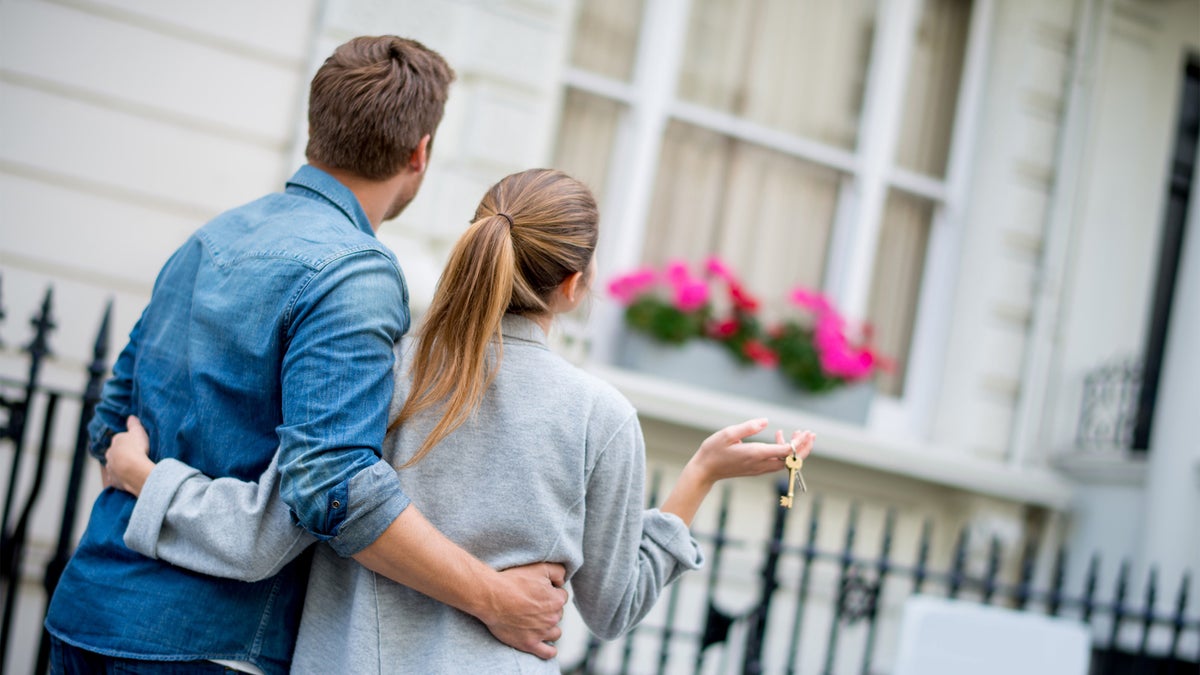
Starter home or forever home? Young couple holding keys looking at house. (andresr)
House hunting can feel like a never-ending series of choices. Apartment or home? City or suburbs? One story or two? Carpeting or wood floors? But if there's one question that really keeps buyers up at night, it's the one they must ask themselves straight out of the gate: Should I buy a starter home or a forever home?
In the past, there was no question: First-time buyers were nearly always steered toward smaller, more affordable homes to build equity (and credit). Established homeowners were pointed toward abodes that could accommodate a larger family -- and, eventually, visits from adult children and their kids. But that's all been turned on its head now.
In fact, a new study by Bank of America found that 75% of first-time buyers plan to bypass a starter home and splurge on a house that will serve them for the long haul. Meanwhile, retirees are increasingly eager to jettison the hassles of a huge family home, opting instead for smaller digs.
So which is right for you? Here are some questions to ask yourself to help point you in the right direction.
Where am I in life?
Every home search is different, but identifying your current stage of life will help narrow your focus, says Maria Babaev of New York's Douglas Elliman. Just remember, life stages aren't necessarily dictated by age anymore. A millennial could be looking to start a family and settle down for the long term, while a middle-aged couple without kids might prefer to pioneer a neighborhood with a starter home. So take any advice you might hear about what type of home is "appropriate" for your age with a huge grain of salt. A truckload of salt! Instead, home in on what feels right for you.
What type of home will fit the way I live today?
Don't buy mainly for the future, say Jessica Peters and Stephanie O'Brien of the Peters-O'Brien Team of Douglas Elliman. While you may have a preconceived idea of where you'll be in five years, remember that life's favorite pitch is the curveball. (The knuckleball also seems to be a specialty.) Be realistic -- you may be ready to decorate your dream home, but the cold hard fact is that most people move 11.4 times in their lifetime.
Babaev says a starter home is a better bet for those buyers whose lives are "constantly shifting." This means people who change jobs often, get relocated, or have a growing family. Other starter-home candidates include anyone with frequent changes in finances or tastes that tend to fluctuate. But if you're a buyer looking for "an enduring lifestyle and sense of community" instead of just a roof over your head, Babaev puts you in the forever home category.
How much can I afford?
Bottom line: The amount of down payment you can afford will help you decide between home types.
"Starter homes typically have a lower home price value, meaning your down payment will likely be less than that of a forever home," says Ray Rodriguez, regional mortgage sales manager at TD Bank. When eyeballing your finances, remember to look beyond your estimated mortgage payment and figure in other monthly costs such as utilities, homeowners association fees, cable, and internet. And when in doubt, don't stretch past what you can afford, since you never know what could be coming around the corner.
Do I want to make a big profit on my home once I sell?
Consider the investment aspect of your decision when choosing between a starter or forever home. If you're not looking for a huge return on investment and can afford a property priced at the top of the market, a forever home is in your sights. Forever homes "are generally occupied for much longer periods of time, versus a starter home," says Peters. And while a dream home will typically hold its value, it will take longer to drastically appreciate. But if you're hoping to make a tidy profit on your house in the foreseeable future, go for a starter home. Just remember that, according to Peters and O'Brien, the payoff timeline is likely five years.
Might I like to be a landlord one day?
One thing to keep in mind with a starter home is that even when it no longer suits your needs, it could be someone else's dream rental.
"One of the great benefits of a starter home is the opportunity to turn it into a rental property down the road," says Rodriguez. But first do a gut check to make sure you can handle being a landlord (i.e., vetting tenants and managing maintenance). If so, investing in a starter home that can become a rental property could turn into a great source of added income later in life. Better yet, put the extra dollars from a rental toward the eventual purchase of your forever home.
-- -- -- -- --
Watch: Is It Smarter to Rent or Buy?